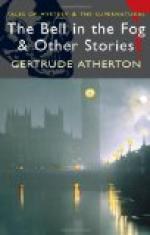“I wish he were alive and here,” he thought, with a sigh. “What a jolly little companion he would be! And this fine old mansion would make a far more complementary setting for him than for me.”
He turned away abruptly, only to find himself face to face with the portrait of a little girl who was quite unlike the boy, yet so perfect in her own way, and so unmistakably painted by the same hand, that he had long since concluded they had been brother and sister. She was angelically fair, and, young as she was—she could not have been more than six years old—her dark-blue eyes had a beauty of mind which must have been remarkable twenty years later. Her pouting mouth was like a little scarlet serpent, her skin almost transparent, her pale hair fell waving—not curled with the orthodoxy of childhood—about her tender bare shoulders. She wore a long white frock, and clasped tightly against her breast a doll far more gorgeously arrayed than herself. Behind her were the ruins and the woods of Chillingsworth.
Orth had studied this portrait many times, for the sake of an art which he understood almost as well as his own; but to-day he saw only the lovely child. He forgot even the boy in the intensity of this new and personal absorption.
“Did she live to grow up, I wonder?” he thought. “She should have made a remarkable, even a famous woman, with those eyes and that brow, but—could the spirit within that ethereal frame stand the enlightenments of maturity? Would not that mind—purged, perhaps, in a long probation from the dross of other existences—flee in disgust from the commonplace problems of a woman’s life? Such perfect beings should die while they are still perfect. Still, it is possible that this little girl, whoever she was, was idealized by the artist, who painted into her his own dream of exquisite childhood.”
Again he turned away impatiently. “I believe I am rather fond of children,” he admitted. “I catch myself watching them on the street when they are pretty enough. Well, who does not like them?” he added, with some defiance.
He went back to his work; he was chiselling a story which was to be the foremost excuse of a magazine as yet unborn. At the end of half an hour he threw down his wondrous instrument—which looked not unlike an ordinary pen—and making no attempt to disobey the desire that possessed him, went back to the gallery. The dark splendid boy, the angelic little girl were all he saw—even of the several children in that roll-call of the past—and they seemed to look straight down his eyes into depths where the fragmentary ghosts of unrecorded ancestors gave faint musical response.
“The dead’s kindly recognition of the dead,” he thought. “But I wish these children were alive.”
For a week he haunted the gallery, and the children haunted him. Then he became impatient and angry. “I am mooning like a barren woman,” he exclaimed. “I must take the briefest way of getting those youngsters off my mind.”




